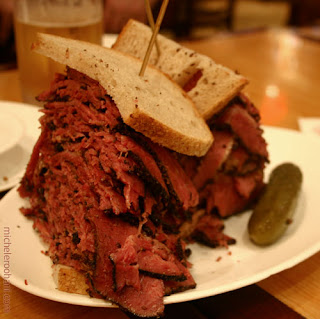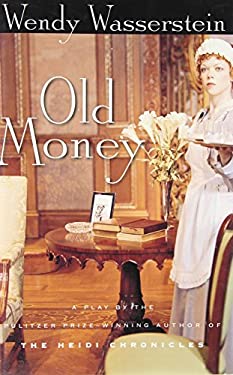These were the first words Wendy Wasserstein ever spoke to me. Or rather, about me, I should say. We had just finished the first day of a week-long workshop of her play Old Money at Lincoln Center in May of 2000, in preparation for the upcoming production that would go into rehearsals in October of the same year. The ever-kind Mark Brokaw had asked me to assist him on the production, and invited me to sit in on the workshop, and at the end of the first day, after the actors left and I lingered, hoping I'd be allowed to stay and hear how Wendy and Mark talked about what they'd learn from having heard the play, Wendy gestured to me and said those words. "I like him," she giggled, in that endearing way that made you feel included. "He knows when to laugh."
The First Laugh
Knowing when to laugh was a matter of great import to Wendy. When I worked for her over the course of the next few years, the first first laugh was something she'd talk about. For her, the first laugh was to a comedy what the first song was to a musical - if it didn't come early enough and wasn't pitch-perfect, you'd lose the chance to introduce your audience to the piece.
After Old Money opened, Wendy asked me to type for her. I was her amanuensis, I guess, although I only learned that word recently, in the context of Milton, who was blind when he "wrote" Paradise Lost. The poem was transcribed by his daughters, to whom he recited it in its entirety. I imagine them furiously scribbling down his lines of perfect iambic pentameter, secretly bemoaning their cruel lot in life to each other later. "If only we weren't the daughters of a brilliant blind poet," Anne Milton, the elder, would complain to Mary, the younger. "We could go out on Saturday nights like the rest of the Puritan girls. But instead we're stuck home scribbling away. And don't even get me started on my ink-stained fingers. Who's ever going to want to slip a ring on one of these?"
A Life In The Theater
I'm not sure exactly what I'd be doing today if I hadn't met Wendy. Unlike many of my peers, I live on the money I make directing and writing. In my twenties, when the income I made from directing was the meagerest of trickles, working for Wendy was the only way I could afford to pay my rent and buy my groceries and go out dancing. In addition, my first professional directing job was at Theater J in Washington, D.C. - two one-acts Wendy had written and given to the little theater to produce if and only if I got to direct them. The first was called Welcome To My Rash, a piece that's almost unbearably painful for me to look at now, about a sick, middle-aged writer struggling with her illness and loneliness. The second was a one-act version of Third, which would grow up and become Wendy's last full-length play.
I am not resilient the way many of my friends are, and I think working a day-job would've broken me. But I didn't need a day-job, because I had Wendy. When I would kvetch to her about how unfair it was that young directors with trust funds could stay in New York and assist for free while I had to go gallivanting around the country directing at colleges, she would tell me that she was my trust fund, and I would remember how lucky I was to be able to support myself in a job that paid well, didn't require early mornings, and allowed me to learn about my field.
Writing
 Up until and including the time that I worked for Wendy, I never wanted to write. I know this, because I didn't write anything, and I'm someone who believes that people do what they want to do. I haven't actually parsed through the cause-and-effect of losing Wendy and starting to write. Was it something that would've happened if she hadn't passed away, because my proximity to her inspired it, like the Fantastic Four, who developed their superpowers after being exposed to cosmic rays (not to be confused, of course, with the gamma rays that turned Bruce Banner into the Incredible Hulk)?
Up until and including the time that I worked for Wendy, I never wanted to write. I know this, because I didn't write anything, and I'm someone who believes that people do what they want to do. I haven't actually parsed through the cause-and-effect of losing Wendy and starting to write. Was it something that would've happened if she hadn't passed away, because my proximity to her inspired it, like the Fantastic Four, who developed their superpowers after being exposed to cosmic rays (not to be confused, of course, with the gamma rays that turned Bruce Banner into the Incredible Hulk)?One of the first things I ever wrote was a play about a young director and the established writer he works for, titled WORK. I've been hacking away at it for years (click here to go to my website and download the sample). I have no idea if the play will ever have any life, but I know that writing it helped me tremendously as I struggled with Wendy's loss the ache of missing her. So maybe losing Wendy was the cause, and writing the effect. I am positive that I'd never have had the fortitude to write my young adult novel, ONE MAN GUY, if it hadn't been for the years I spent at Wendy's side.
 Or sometimes I think, Wendy died so young, and with so many things she still wanted to write, that I started writing to try to fill the void her absence created. Chekhov, after all, wrote hundreds of short stories and 5 brilliant plays before he died at the age of 44. Sometimes, when I want to depress myself, I think about all the work he would've made if he had lived to be 50, or 60 or 70. It's enough reason for everyone to pick up a pen and start writing their version of funny, sad, heart-breaking characters on a Russian estate.
Or sometimes I think, Wendy died so young, and with so many things she still wanted to write, that I started writing to try to fill the void her absence created. Chekhov, after all, wrote hundreds of short stories and 5 brilliant plays before he died at the age of 44. Sometimes, when I want to depress myself, I think about all the work he would've made if he had lived to be 50, or 60 or 70. It's enough reason for everyone to pick up a pen and start writing their version of funny, sad, heart-breaking characters on a Russian estate.Closer Than Ever
Writing makes me feel close to Wendy. Unlike directing, with which I've had mentors galore, Wendy is the only one of two writers I've ever really been close to in that way, and so the act of it reminds me of her. Writing my play about her, this blog, my young adult novel - every time I sit down at the keyboard, I hear her voice, and most of the time, it's making me laugh. The rest of the time, it's giving me advice, which is inevitably practical. When she came to see my production of The Seagull, she told me how much the character of Trigorin spoke to her, in his obsession with his writing, and how he (and Chekhov) were clearly so interested in the craft of the art. Wendy took great pride in that, in her own work. And I know that some people feel her plays are a little old-fashioned, and not edgy enough, or too nice, and until I get to direct one again and prove those people wrong, I hope we can all agree that they are, at least, written by someone who brings great craft to her field.
Pastrami and Cheesecake

October 18th was Wendy's birthday. We had plans to lunch together on the day that neither one of us knew would be her last birthday, in 2005. We were supposed to meet at the little writing studio she kept on 60th St (in the same building where Rafael was living when I met him, and if you think that wasn't Wendy nudging me along from beyond, you gravely underestimate her). Wendy wasn't feeling well enough, however, to leave her apartment, so I went to the Carnegie Deli and picked up pastrami sandwiches and cheesecake, one of our perennial favorites.
She was in bed, where I served her the delicious fare. She picked at her sandwich and didn't even touch the cheesecake. If I weren't in such deep denial about her medical state, this would've been a clear sign that something was wrong. I ate my portion with gusto, blabbering on about boys and work.
I try to do something that would honor Wendy ever January 30th. Before her niece Samantha moved out West, we'd sometimes meet for a cocktail at Cafe des Artistes, which like Wendy, is no longer with us. The first anniversary of Wendy's death, I went to see Sarah Ruhl's stunningly beautiful play The Clean House at Lincoln Center, in the same theater where Old Money had happened years before. I wept through most of The Clean House and left the theater knowing that I would direct the play one day (which I got to do at Syracuse Stage two years ago, one of my finest productions).

 But the one thing I always do January 30th is go to the Carnegie and order a pastrami sandwich and a slice of cheesecake. I am passed the age where I can finish both those magnificent servings by myself, but I still do it, knowing I'll have leftovers for another meal. And so I invite you to partake of this tradition, wherever you are today. Order some pastrami or a slice of cheesecake, and spend a moment thinking about Wendy, and how lucky those of us who knew her were to have known her, and how lucky all of us are to have her work.
But the one thing I always do January 30th is go to the Carnegie and order a pastrami sandwich and a slice of cheesecake. I am passed the age where I can finish both those magnificent servings by myself, but I still do it, knowing I'll have leftovers for another meal. And so I invite you to partake of this tradition, wherever you are today. Order some pastrami or a slice of cheesecake, and spend a moment thinking about Wendy, and how lucky those of us who knew her were to have known her, and how lucky all of us are to have her work. 




